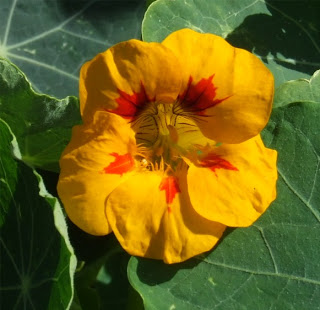Gardeners are on the frontline of climate change. They are actually experiencing it on a day to day level. Here is the reason why;
If you get up in the morning in your airconditioned house, and get into your airconditioned car, go to your airconditioned office, and then eat your junk food sandwich which is filled with genetically modified cornstarch and canola oil, and then go home and continue the cycle over again until you go to bed and awaken to start all again, you are not going to see a problem. No problem at all! You are not experiencing anything other than your own little bubble which is hermetically sealed from the real world.
Whereas, even if you lead the same sort of life, but additionally you spend one or two hours of your time outside with your hands in the soil growing things, you are going to notice that it is wetter, dryer, cold, warm or that the plants are flowering earlier or latter, as the seasons and climate patterns change. Gardeners have been noticing these trends for years.
Knowledge is about noticing, knowledge is joining the dots. That is real knowledge gardeners possess through experience and observation, so in a very domestic and modest way, gardeners have real radical power. Case in point, you only have to look at an old gardening book to realise, based on your experience, that the climate is changing. Garlic is said to be planted before the shortest day and harvested on the longest day. I believe that if you plant and harvest at the equinox, then you will actually get a crop worth harvesting. The tomato season is getting longer and longer due to a longer spring and warmer autumn, as are the growing season of other warm loving plants. Who had zucchini’s produce for much longer this year and last? Also as the colder seasons get shorter, cold loving plants bolt to seed much quicker.
However, as our plants adapt to this new paradigm, so does the genetic code in their seeds. It is this genetic material that we save that make us invaluable in the period of change that is rapidly approaching us. In society this knowledge is lost, and it is up to us to educate family, friends and the community around us in these skills so that they do have a snowball’s chance in the Sahara to adapt to food shortages.
So my final words of wisdom, are to cherish your garden. Learn and nurture it as it nurtures you, and take the time to congratulate yourself for gathering that fountain of knowledge, for all gardeners will be indispensable in the very near future!


You make a very good point for seed saving, Gav.
The climate doesn’t change incredibly fast (and perhaps that’s part of the problem – it’s easy for most humans not to notice). Each year, the growing season gets just a little bit longer, or there’s slightly less rain, or overnight temps don’t get quite so low.
By saving the seeds from your best plants each year, you’re selecting for the traits that are allowing them to thrive in the slowly changing conditions. So each year, your plant varieties are slowly evolving along with the climate.
This is going to be important as we go forward, as the commercially-available seed varieties are becoming less suitable to the conditions listed on the back of the packet.
Hey Darren, great to hear from you.
This post just came to me in a blinding flash when I was in the garden the other day, and the bubble bit came to me whilst traveling to work on the airconditioned train towards the airconditioned office! I put two and two together and got a nice little essay
Gav